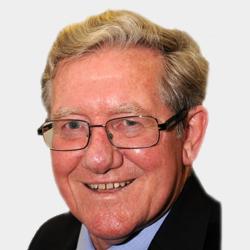Submitted by J.W. Thulborn on Wed, 13/11/2024 - 10:35
David P. Farrington, O.B.E., was a towering figure in our field and a wonderful academic, colleague, and friend of the Institute of Criminology. He passed away on 5 November, at the age of 80, from Motor Neurone Disease.
David joined the Institute in 1969, shortly after his PhD, initially as a ‘research officer’ to write computer programmes for analysing the data of the Cambridge Study on Delinquent Development.[1] In 1976 he became University Lecturer and then, in 1992, Professor of Psychological Criminology. He retired in 2012. For all of us who had the privilege of working with him as colleagues, students or visitors he was a role model of encouragement, inspiration and scientific rigour.
David was an incredibly prolific academic. His work includes over 130 edited books and more than 900 journal articles and book chapters. What counts most, though, is the tremendous significance of his contributions to knowledge: His pioneering work established the scientific foundations of developmental criminology. He made key contributions to the criminal career paradigm and its key axioms and hypotheses; he discovered many of the key childhood risk and protective factors associated with later offending; his scholarship greatly advanced our understanding of life-events and labeling processes over the life course; he promoted the differential scientific investigation of alternative developmental theories; and he had a leading role in establishing developmental crime prevention as a field of research, policy, and practice.
David has won over 30 prizes and honours in recognition of his work, including the Stockholm Prize of Criminology in 2013 in recognition of his pioneering research on early-life interventions and the cost-effectiveness of developmental programs over the life-course. He was a Fellow of the British Academy, the Academy of Medical Sciences, the British Psychological Society, and the American Society of Criminology. He was president of the British Society of Criminology, the European Association of Psychology and Law, and the Academy of Experimental Criminology. And he served on numerous national and international professional boards. He was particularly tied to the American Society of Criminology conferences, which he attended every year since the late 1970s until COVID. He served as president of the American Society of Criminology in 1998/99, the first and only person to do so from outside North America. Besides his involvement in innumerable panels and meetings he utterly enjoyed hitting the dance floor, especially to music by ABBA.
David greatly enjoyed collaboration with others and was never short of ideas for a next study needed to push back the frontiers of knowledge. Throughout his career, he worked extensively with some of the foremost scholars of criminology. Many of them spent some time as visitors in Cambridge where they enriched the intellectual life of the Institute with new research ideas and interest in others’ work. Amongst many others, I mention Terrie Moffitt, Rolf Loeber and Magda Stouthamer-Loeber, Daniel Nagin, Adrian Raine, Brandon Welsh, Anna Baldry, Alex Piquero, and Richard Tremblay.
David taught and supervised many generations of PhD students. He would teach them to think logically and clearly, to avoid social science jargon, to write simply, and to be methodologically scrupulous. Most of his 36 PhD supervisees have themselves become leading academics in criminology, passing on David’s enthusiasm, energy, optimism, warmth and intellectual rigour to the next generation of students and researchers across the world. Besides many who are now in academic positions in the UK or in the US, students of David taught or teach in Italy (the late, Anna Costanza Baldry), Portugal (Miguel Basto-Pereira, Hugo S. Gomes), Denmark (Sarah Bennett), Canada (Christopher J. Koegl), Cyprus (Andreas Kapardis), and Brazil (Joseph Murray).
A key pillar of his work was the groundbreaking research based on the Cambridge Study in Delinquent Development, a prospective longitudinal study of 411 males born around 1953 from ages 8 to 61. It has led to over 300 publications about the patterns and childhood predictors of offending from childhood to adulthood, the links between life events and offending, and the wider health and attainments of study participants. Results from this work became the cornerstone of David’s key contribution to criminological theory, the Integrated Cognitive Antisocial Potential theory of delinquent development.
David deeply cared about research that had practical and policy implications. He played a key role in the introduction and development of prevention science into criminology, and he advocated for early prevention for many decades. He led the development of many systematic reviews on strategies relevant to the prevention of antisocial behaviour, bullying, and crime across the life-course. Moreover, he found time to engage in an advisory role with a large number of agencies including the U.S. National Academy of Sciences, U.K. Department of Health, and the European Commission, and he provided expertise on strategies to better address juvenile delinquency and offending. His work has profoundly shaped public policy and preventative measures in the UK and worldwide.
David’s unique contributions to criminology worldwide, and to the Institute in particular, are without parallel, and will always be remembered. We have started to organise a symposium in honour of David to celebrate his achievements and bring together friends and colleagues. More details will follow soon.
David is survived by his wife Sally, three daughters, and ten grandchildren. In honour of David's memory, the family requests that donations be made to the Motor Neurone Disease Association
[1] You may want to read his interview with his daughter published in 2016 in The Psychologist, https://www.bps.org.uk/psychologist/i-think-my-parenting-was-based-gut-decisions
For any enquiries, please contact dirpa@crim.cam.ac.uk

